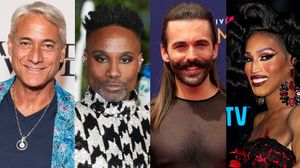Presidential
contender Rudy Giuliani has been winning over some
conservative Republicans by promising to appoint judges in
the mold of Supreme Court justice Antonin Scalia and
others who might seem likely to limit the reach of the
Roe v. Wade decision legalizing abortion.
Judges he named while he was mayor of New York
City, however, could never be mistaken for Scalia.
Giuliani's
promise has helped overcome his abortion rights support as
an issue for conservative voters. After all, the next
president can do little about abortion except to name
judges who interpret the law more strictly. As a
result, some prominent conservatives, including
televangelist Pat Robertson, have decided that Giuliani's
view of judges matters most.
Giuliani was
scheduled to describe his views in a speech Friday to
the Federalist Society, a mainstay of the conservative legal
movement that includes several members who are
advising Giuliani's campaign. One of those, former
solicitor general Ted Olson, said in an interview that
Giuliani needs to reach out to conservatives and reassure
them. He said, ''On the important issues, to the
extent those issues are being controlled by judges, he
will appoint the kind of people that you would like.''
Giuliani's stance
on judges dates to the Reagan administration, Olson
said, when both men worked as senior Justice Department
officials. Back then, at morning meetings and over
sandwiches or pizza in the attorney general's dining
room, they talked about how judges should do their jobs,
Olson said.
However, years
later, when Giuliani was mayor of New York, he appointed
far more liberal judges.
Mostly Democrats,
his appointees included an abortion rights supporter,
gay activists, and a judge who ordered the city to pay for
an indigent New Yorker's sex- change operation, among
others. Another judge argued that prostitution should
be redefined according to the changing cultural and
sexual practices of recent decades.
To be sure,
Giuliani was limited by the city's system of appointing
judges. An advisory committee, controlled by Democrats,
submitted candidates from which Giuliani could choose.
And Giuliani has noted he was choosing municipal
judges who mostly handled criminal cases, not judges
who would evaluate matters of constitutional law.
''They hear
ordinary criminal cases and civil cases; they're not going
to be interpreting the scope of the Bill of Rights or
the Establishment Clause or the First Amendment,''
said Northwestern University law professor Steven
Calabresi, another Giuliani adviser and Federalist
Society member. ''Also, the other people involved in the
process of making judges are going to be more
liberal.''
Still, rival
Republican campaigns were calling attention to his record on
city judges earlier this year and could do so again.
Foes also point
to Giuliani comments, earlier this year, that there is no
guarantee a conservative judge would overturn Roe
v. Wade.
''They can look
at it and say, 'Wrongly decided 30 years ago; whatever it
is, we will overturn it,''' he told CNN in April. ''They can
look at it and say, 'It has been the law for this
period of time; therefore, we are going to respect the
precedent.' Conservatives can come to that conclusion
as well. I would leave it up to them. I would not have a
litmus test on that.''
Many
anti-abortion activists are unmoved by Giuliani's promise to
appoint conservative judges.
''Rudy Giuliani
has not changed his position -- he is running as a
pro-abortion candidate; he's been consistent with that,''
David N. O'Steen, executive director of the National
Right to Life Committee, said Tuesday, when the group
endorsed Giuliani rival Fred Thompson, a former
Tennessee senator.
Not that abortion
is a litmus test for Giuliani; he has said judicial
nominees should not decide ahead of time on future cases.
His job description would seek judges who interpret
the law strictly, paying attention to what lawmakers
intended.
''Mayor Giuliani
is committed to appointing judges who will follow the
Constitution and not make up the law,'' said Calabresi.
Also on the
society's three-day program: Scalia, fellow justices
Clarence Thomas and Samuel Alito, and Chief Justice
John Roberts. President Bush addressed the group
Thursday.
It's an important
address for Giuliani, Olson said: ''It is less than a
year before the election, less than two months before the
primaries. These are people who are activists in the
legal profession, they are people that do things, and
they are very, very prominent people.'' (Libby Quaid,
AP)


















































































